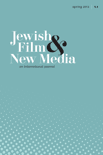
Jewish Film & New Media-An International Journal
Scope & Guideline
Exploring the Intersection of Jewish Culture and Cinematic Expression
Introduction
Aims and Scopes
- Jewish Identity and Representation:
The journal investigates how Jewish identity is constructed, represented, and perceived in film and new media, analyzing the complexities and nuances of Jewish experiences. - Cultural Critique and Historical Context:
It provides critical examinations of historical contexts and cultural narratives surrounding Jewish filmmakers and their works, often addressing broader societal issues such as diaspora, gender, and ethnicity. - Interdisciplinary Approaches:
The journal employs interdisciplinary methodologies, integrating perspectives from cultural studies, film studies, gender studies, and Jewish studies to foster a comprehensive understanding of Jewish media. - Focus on Diverse Voices:
There is a consistent focus on diverse Jewish voices, including those from Mizrahi and other underrepresented communities, highlighting their contributions to the cinematic landscape. - Exploration of Humor and Comedy:
The exploration of humor, particularly Jewish humor in film and comedy, is a recurring theme, examining how it reflects and shapes Jewish identities and experiences.
Trending and Emerging
- Disability and Diaspora in Jewish Media:
Recent publications highlight the intersection of disability, diaspora, and Jewish identity, indicating a growing interest in how these themes interact within the context of Jewish media. - Feminist Perspectives in Jewish Cinema:
There is an increasing focus on feminist critiques and representations of gender within Jewish cinema, showcasing women's voices and experiences in a historically male-dominated field. - Post-Secular Jewish Identity:
The exploration of post-secular identities and their representation in film reflects a trend towards understanding Jewish identity in the context of modern secularism and multiculturalism. - Critiques of Capitalism and Realism:
Emerging analyses of realism in Israeli cinema, particularly critiques of capitalism, suggest a growing interest in the socio-economic dimensions of Jewish narratives. - Intersections of Jewish Humor and Social Commentary:
An increasing number of studies are examining how Jewish humor serves as a form of social commentary, reflecting broader cultural and political themes.
Declining or Waning
- Traditional Narratives of Jewish History:
There seems to be a decreasing focus on traditional narratives of Jewish history that do not intersect with contemporary themes, as the journal shifts towards more modern and diverse representations. - Conventional Film Analysis:
There is a noticeable decline in the analysis of conventional film techniques or mainstream Hollywood narratives, with a greater emphasis now on avant-garde and experimental approaches. - Focus on Historical Figures without Contemporary Relevance:
Research on historical figures in Jewish cinema that lacks contemporary relevance or connection to current Jewish identity discussions appears to be waning, as the journal prioritizes themes that resonate with today's sociopolitical climate.
Similar Journals
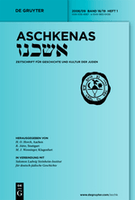
Aschkenas-Zeitschrift fuer Geschichte und Kultur der Juden
Exploring the Depths of Jewish HeritageAschkenas-Zeitschrift fuer Geschichte und Kultur der Juden, published by WALTER DE GRUYTER GMBH, is a distinguished academic journal that delves into the rich history and cultural heritage of Jewish communities. Based in Germany, this journal is indexed under the ISSN 1016-4987 and E-ISSN 1865-9438, making its contributions accessible to an international audience. Although it currently operates without open access options, the journal serves as an important platform for researchers in the fields of Arts and Humanities, History, Literature and Literary Theory, and Religious Studies, as evidenced by its publication history from 1996 to 2023. While ranked in the fourth quartile across various categories on Scopus, the journal provides critical insights and interdisciplinary approaches that enrich the understanding of Jewish cultural narratives. Researchers, professionals, and students alike will find valuable content that not only highlights historical perspectives but also engages with contemporary cultural discussions. This journal remains a vital resource for those seeking to deepen their knowledge and contribute to ongoing dialogues in Jewish studies.

Jewish Historical Studies-Transactions of the Jewish Historical Society of England
Exploring Diverse Narratives of Jewish HeritageJewish Historical Studies - Transactions of the Jewish Historical Society of England is a premier scholarly journal dedicated to advancing the understanding of Jewish history in its diverse contexts. Published by UCL PRESS, this open access journal has been freely accessible since 2015, providing an invaluable resource for researchers, educators, and students alike. With an ISSN of 0962-9696 and E-ISSN 2397-1290, it features a wide variety of articles that delve into topics related to the historical, cultural, and societal aspects of Jewish communities. Located at University College London, the journal is committed to fostering interdisciplinary insights and encouraging critical discourse within Jewish studies. Its dedication to open access amplifies the visibility and dissemination of high-quality research, ensuring that vital scholarship reaches a global audience. As a vital platform for sharing cutting-edge research, Jewish Historical Studies plays a crucial role in the ongoing dialogue regarding Jewish history, heritage, and identity.
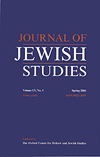
JOURNAL OF JEWISH STUDIES
Illuminating Jewish History and CultureJOURNAL OF JEWISH STUDIES, published by the Oxford Centre for Hebrew and Jewish Studies, stands as a distinguished platform for scholarly discourse in the fields of Jewish history, culture, literature, and religious studies. With its ISSN 0022-2097, this journal is recognized for its significant contributions to understanding Jewish heritage and thought, achieving commendable rankings in various categories, including Q1 in Literature and Literary Theory and Q2 in History and Cultural Studies, as of 2023. The journal fosters rigorous academic engagement and encourages researchers and scholars worldwide to explore the complexities of Jewish identity and its interconnections with broader historical narratives. Operating without an open access model, it nonetheless ensures a wide reach through its well-regarded reputation, making it an essential resource for anyone invested in Jewish studies. With a publication history spanning from 2002 to 2024, the journal continues to serve as an invaluable repository of knowledge and insight for students, researchers, and professionals alike.
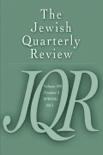
JEWISH QUARTERLY REVIEW
Engaging Minds with In-Depth Jewish ScholarshipJewish Quarterly Review, published by University of Pennsylvania Press, is a distinguished academic journal that delves into the multifaceted realms of Jewish culture, history, and religious studies. With a rich publication history dating back to 1953 and an impressive track record of rigorous scholarship, this journal maintains a Q2 ranking in key categories such as Cultural Studies, History, and Religious Studies in 2023, placing it among the top-tier journals in its field. The ISSN number 0021-6682 and the E-ISSN 1553-0604 ensure that its scholarship is widely accessible and traceable in academic databases. While the journal is not open access, it remains an essential resource for researchers, professionals, and students seeking in-depth analysis and perspectives on Jewish thought and heritage. The JQR is known for its editorial commitment to enhancing understanding and dialogue across cultural and historical contexts, making it an invaluable asset for anyone engaged in Jewish studies and related disciplines. With its headquarters in Philadelphia, PA, the journal continues to foster scholarly engagement and critical discourse on Jewish identity and experience through its carefully curated articles and reviews.
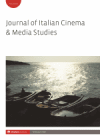
Journal of Italian Cinema and Media Studies
Exploring the Rich Tapestry of Italian Cinema and MediaThe Journal of Italian Cinema and Media Studies, published by INTELLECT LTD, is a premier academic journal dedicated to the exploration and critical analysis of Italian cinema and media. Since its inception in 2013, the journal has contributed significantly to the discourse surrounding the intersections of film, culture, and society, making it a vital resource for researchers and professionals alike. With an impressive span of converged years through 2024 and categorized in various quartiles, such as a Q1 ranking in Visual Arts and Performing Arts, the journal stands out in its field. Although it does not currently offer open access, the rigorous scholarship it publishes is accessible to a wide audience, contributing to ongoing dialogues in communication and cultural studies. The journal's impact is further reflected in its Scopus rankings, positioning it within the 64th percentile in Visual Arts and Performing Arts and the 21st percentile in Communication. As a critical avenue for scholarly exchange and creative inquiry, the Journal of Italian Cinema and Media Studies is essential for anyone engaged in the study of media, culture, and the arts.
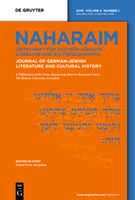
Naharaim
Unveiling Historical Narratives of the Near EastNaharaim is a distinguished academic journal dedicated to fostering interdisciplinary scholarship in the field of Near Eastern studies. Published by Walter de Gruyter GmbH, this journal aims to provide a platform for innovative research that explores the rich historical, cultural, and social dynamics of the region. With an ISSN of 1862-9148 and an E-ISSN of 1862-9156, Naharaim adheres to high academic standards, although it does not currently offer open access options. The journal aspires to engage a global audience of researchers, professionals, and students eager to contribute to and gain insights from the evolving discourse surrounding Near Eastern cultures and histories. Through rigorous peer-reviewed articles, Naharaim plays a vital role in advancing knowledge and understanding in a field of study that is increasingly relevant in today’s interconnected world.
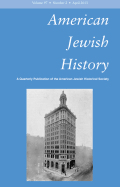
AMERICAN JEWISH HISTORY
Connecting Cultures through Historical InsightAMERICAN JEWISH HISTORY is a premier academic journal published by Johns Hopkins University Press, dedicated to the exploration and analysis of the Jewish experience in the American context. With ISSN 0164-0178 and E-ISSN 1086-3141, this journal serves as a vital resource for scholars and students in the fields of cultural studies, history, and religious studies, as evidenced by its placement in the Q3 quartile across these disciplines in 2023. Reaching a broad audience interested in the historical, social, and cultural dimensions of the American Jewish narrative, the journal has converged in various years, ensuring a robust collection of multidisciplinary research and discussions. Although it operates under a traditional subscription model, the journal remains an essential platform for critical analysis, fostering deeper understanding of Jewish identity and history. With Scopus rankings placing it at the 60th percentile in History and 62nd percentile in Religious Studies, AMERICAN JEWISH HISTORY stands as a respected publication that significantly contributes to the discourse surrounding Jewish history and culture in the United States.

NEW GERMAN CRITIQUE
Navigating the Complexities of Identity and MemoryNEW GERMAN CRITIQUE is a prominent academic journal published by Duke University Press, focusing on the dynamic intersections of German studies, cultural theory, and social thought. With its ISSN 0094-033X and E-ISSN 1558-1462, this journal facilitates a critical dialogue within the Arts and Humanities and Cultural Studies fields. As a Q3-ranked journal in both categories as of 2023, it represents a significant platform for scholars exploring contemporary issues through a German lens, addressing themes of identity, memory, and cultural politics. Although NEW GERMAN CRITIQUE is not an open-access journal, it remains a crucial resource for researchers, professionals, and students interested in the evolving landscape of cultural studies, inviting contributions that foster innovative perspectives and facilitate intellectual exchange. Founded in 1988 and continuing its vital discourse into 2024, the journal is headquartered in Durham, North Carolina, and serves as a touchstone for those engaged in the complexities of modern German culture and its global implications.
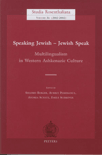
STUDIA ROSENTHALIANA
Unveiling the Rich Tapestry of Jewish Literature and ArtSTUDIA ROSENTHALIANA is a distinguished journal published by Amsterdam University Press, specializing in the interdisciplinary study of Jewish culture and history, particularly as it relates to the field of Rosenthaliana, encompassing literature, art, and historical scholarship. With a robust academic legacy dating back to its inception in 1970, the journal has evolved through various publication phases, maintaining a commitment to fostering scholarly discourse and disseminating significant research. Although it does not currently participate in an open access model, STUDIA ROSENTHALIANA continues to contribute invaluable insights to the fields of Jewish studies, cultural analysis, and historical research. Researchers, professionals, and students can benefit from its comprehensive essays, critical reviews, and analytical studies that enrich our understanding of Jewish heritage and modern implications. The journal's influence and relevance in its field make it an essential resource for anyone invested in contemporary debates and analyses concerning Jewish culture and identity.
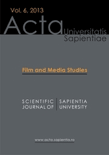
Acta Universitatis Sapientiae-Film and Media Studies
Illuminating Emerging Trends in Film and Media PracticesActa Universitatis Sapientiae-Film and Media Studies is a distinguished journal dedicated to the exploration of film and media within the broader context of cultural studies. Published by SCIENDO, this journal has been an essential resource for researchers, professionals, and students since it adopted an Open Access model in 2013, facilitating worldwide accessibility to cutting-edge scholarship. With its ISSN 2065-5924 and E-ISSN 2066-7779, Acta Universitatis Sapientiae aims to publish high-quality, peer-reviewed articles that promote innovative research and critical discourse in film and media studies. Located in Warsaw, Poland, and contributing to the international academic community, this journal provides a platform for interdisciplinary dialogue and the examination of emerging trends in media practices, theories, and technologies. By encouraging diverse perspectives, it not only enriches the academic landscape but also nurtures the next generation of scholars in this dynamic field.